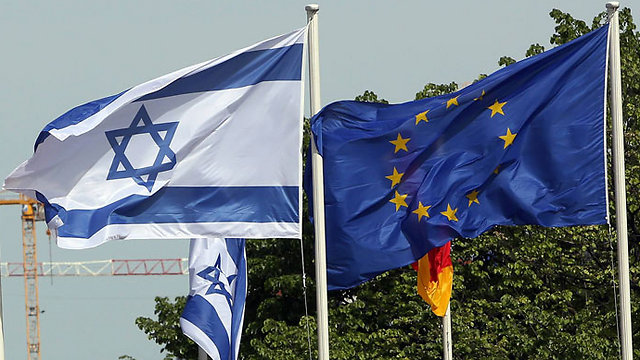
The European Union flag (Photo: AFP)
צילום: AFP
EU: Agreements with Israel only apply within 1967 borders
Israel is battling an EU proposal that will be tabled next week in a meeting of European foreign ministers, which calls for all European Union countries to restrict its international agreements with Israel to within the 1967 borders, thus excluding the settlements.
Two months after introducing labeling for products imported from Israeli settlements, the EU is planning to further differentiate between the areas on either side of the Green Line.
The EU's Foreign Affairs Council, which brings together European foreign ministers, is expected to approve on Tuesday a proposal that is liable to levy new sanctions against Israeli settlements and undermine their international legitimacy.
The proposal calls on all European Union countries to restrict their international agreements with Israel to within the 1967 borders, thus excluding the settlements.
The European External Action Service stands behind the initiative, and Christian Berger, an Austrian diplomat and the head of the Middle East department at the European Commission, has been particularly instrumental in its development.
Israel claims that Berger has for some time been leading an anti-Israel line and is pushing for sanctions against the settlements. Berger was a leading figure in the move to label settlement products.
The Foreign Ministry has received reports that Sweden adopted a decisive role in moving the proposal forward, during an already tense period in Israeli-Swedish relations in the wake of controversial remarks made by the Swedish foreign minister. Ireland, France and Finland are also pushing strongly for harsher wording against Israel.
The draft proposal, which was distributed to the EU's 28 member states at the end of the week, stipulates that the EU will continue with the line that a clear distinction should be made between Israel and all the territory that was conquered in 1967, including East Jerusalem and the Golan Heights.
The proposal also states that all international agreements between Israel and the 28 EU member states will apply only to Israeli territory inside the Green Line and not to the West Bank.
The wording of the proposal also ratifies the previous decision regarding labeling of settlement products, clarifying that the move does not constitute a boycott of Israel and that the EU opposes such an action.
The EU will also implicitly condemn Justice Minister Ayelet Shaked's NGO transparency bill and will warn of the silencing of civil society, indicating that it will be forced to take measures to preserve the feasibility of the two-state solution.
Israel views the wording of the proposal with great concern and is working behind the scenes in order to soften the proposal. The Foreign Ministry has distributed guidance to Israeli ambassadors in Europe on how to respond to their contacts regarding the issue.
Policy officials in Israel said that the wording in the new proposal proves that the labeling initiative was never about consumer protection, as the EU claimed, but was in fact a political maneuver to fight against the settlements.
"This proves just how divorced from reality the European diplomatic service is," said one official. "We want to prevent this document at all costs. It is liable to bring about new sanctions."
A senior Israeli ambassador in Europe estimated that the chances of blocking the strong wording of the proposal are very low, and that it comes in response to Israel's retaliation against the labeling initiative – a response that in effect froze collaborative efforts to advance European projects in the Palestinian territories.











